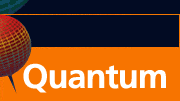CONTACTS
- Coordinator
Sebastian Deffner
-
Quantum Lunch Location:
T-Division Conference Room, TA-3,
Building 123, Room 121
 |


Quantum Institute: Visitor Schedule
The Quantum Lunch is regularly held on Thursdays in the Theoretical Division Conference Room, TA-3, Building 123, Room 121.
The organizing committee includes Malcolm Boshier (P-21), Diego Dalvit (T-4), Michael Di Rosa (C-PCS), Sebastian Deffner (T-4 & CNLS), Changhyun Ryu (P-21) , Nikolai Sinitsyn (T-4), Rolando Somma (T-4), Christopher Ticknor (T-1), and Wojciech Zurek (T-4).
For more information, or to nominate a speaker, contact Sebastian Deffner.
To add your name to the Quantum Lunch email list, contact Ellie Vigil.
Tuesday February 17, 2015
12:30 PM - 2:00 PM
T-4 Conference Room (03-0524-105)
Speaker: Raymond Laflamme ( Institute for Quantum Computing)
Technical Host: Wojciech Zurek
TOPIC: Experimental quantum error correction
Abstract
The last decade has seen the impressive development of quantum information science, both in theory and in experiment. There are many measures that can be used to assess the achievements in the field: new algorithms, new applications and larger quantum processors, to name a few. The discovery of quantum algorithms has demonstrated the potential power of quantum information. To realize this potential requires the ability to overcome the imprecision and imperfection inherent in physical systems. Quantum error correction (QEC) has provided a solution, showing that errors can be corrected with a reasonable amount of resources as long as their rate is sufficiently small. Implementing QEC protocols remains one of the most important challenges in QIP. In the experimental arena, the quest to build quantum processors that could outperform their classical counterparts has led to many blueprint proposals for potential devices based on NMR, electron spin resonance, ion traps, atom traps, optics, superconducting devices and nitrogen-vacancy centres, among others. Many have demonstrated not only the possibility of controlling quantum bits, but also the ability to do so in practice, showing the progression of quantum information science from the blackboard to the laboratory. My presentation will give an overview of some of the recent results in quantum information science on the way to implement quantum error correction. I will show how noise can be characterise efficiently when our goal is to find suitable quantum error correcting codes. I will show demonstrations of control to implement some quantum error correcting codes and finally how can noise be extracted through algorithmic cooling. I will comments on some challenges that need to be solved and a path towards implementing many round of quantum error correction.
|


